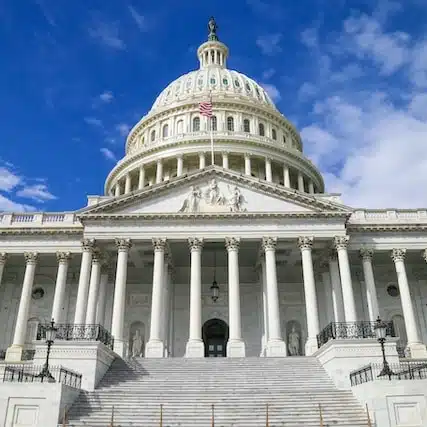Proponents and opponents of the Credit Card Competition Act continue to press their respective cases for passage and rejection of the CCCA by Congress.
Late Monday, the Merchants Payments Coalition fired the latest salvo in its campaign to pass the CCCA, a television commercial that literally shows a consumer getting punched hard in the face by a character representing big banks each time he makes a credit card transaction. The “slap,” as the commercial describes the blow, is meant to metaphorically represents the painful cost of credit card fees to consumers and merchants.
After each slap, the consumer is shown bruised and wearing bandages and getting punched in the face after each successive card purchase. Throughout the commercial, the narrator says big banks make “billions a year” in credit card swipe fees and that consumers are charged “up to 3% in hidden fees” for each purchase with a credit card. Those fees, according to the commercial, cost the average American family up to $1,000 a year.

The 30-second commercial concludes by showing a consumer wearing a neck brace and several bandages on his face as the narrator tells viewers that “only Congress can stop big banks from ripping off consumers. No more getting sideswiped—tell Congress to pass the Credit Card Competition Act now.” The ad is supported by similar digital-banner ads, the MPC says.
The commercial comes on the heels of an ad campaign launched in January by the Electronic Payments Coalition, a bank and network lobbying group that opposes the CCCA. The EPC could not be reached for comment about the MPC’s ad.
“Swipe fees are a punch in the face for small businesses and consumers alike,” says Lyle Beckwith, an MPC executive committee member and senior vice president of government relations for the National Association of Convenience Stores, in a statement. “Both are being beaten up by banks daily and it’s time for Congress to step into the ring and bring this one-sided fight to an end.”
The CCCA would require financial institutions with $100 billion or more in assets to enable at least one network other than Visa or Mastercard for credit card transaction processing. While banks would choose which networks to enable, merchants would choose which network to use. Advocates expect the bill would create network competition when it comes to swipe fees, security, and service, the MPC says.
Separately, the Electronic Payments Coalition continued its opposition to the CCCA by citing a recent study from Indraneel Chakraborty, finance department chairman at the University of Miami’s Herbert Business School, that claims passage of the CCCA would disproportionately benefit the top five merchants in the United States and put small retailers at “a further competitive disadvantage.”
The report contends that, while the 100 largest retailers could see about $3 billion in potential savings, some $1.2 billion, or more than a third of those savings, would go to just the five largest retailers – Walmart, Amazon, Costco, Kroger, and Home Depot, according to the EPC.
“These new government mandates are about little more than lining the pockets of the nation’s largest mega-stores—not about saving businesses on Main Street or American families any money,” says Richard Hunt, executive chairman of the EPC, in a statement. “Even worse than only helping big corporate retailers, like Target and Walmart, these new mandates would actually hurt mom-and-pop small businesses by restricting their access to credit and choking off the billions in rewards they reinvest in their businesses and employees.”
In response to the Chakraborty study’s claims about the potential harm the CCCA would cause small merchants, Doug Kantor, an executive committee member at the MPC and general counsel for the National Association of Convenience Stores, argues the research is deeply flawed.
“This is shoddy research. Small businesses are hit the hardest by swipe fees because they pay the highest rates and have no leverage to fight back,” Kantor says by email. “This report claims $2.9 billion would go to the largest 100 retailers, but the CCCA is expected to save merchants $15 billion, so that leaves $12 billion going to smaller merchants. That might not sound like much money to giant banks and card networks, but it’s certainly a lot to merchants.”





